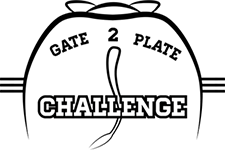Harvey Beef Gate 2 Plate Challenge
The challenge aims to reflect as closely as possible the real life situation of cattle entering the grainfed, MSA graded, domestic supply chain and reward those animals that not only meet requirements for carcass quality but are also profitable at each stage.
Challengers receive detailed feedback on individual and group animal performance at each stage of the supply chain throughout the challenge.
Cattle breeders are able to compare the performance of their own cattle against others on a level playing field and assess the suitability of their breeding for the intended market.
Cattle receive points for only objective, measurable performance traits which are important for profitability at each stage of the supply chain.
The winning team is the one which is most profitable through the supply chain. The winners are announced at the Harvey Beef Gate 2 Plate Gala Awards.
Challengers are able to view their cattle as they progress through the challenge at the Harvey Beef Gate 2 Plate Challenge field day held at Willyung Farms feedlot.
The challenge starts in January with animals congregating at Mount Barker Regional Saleyards before being transported to the feedlot to begin their grain ration. Cattle are fed for approx 85 days before being processed through the Coles Supply Chain, at Harvey Beef where the carcasses are MSA graded.
FAST FACTS ABOUT THE CHALLENGE
The challenge is open to any cattle breeder in Western Australia that breeds cattle suitable for the WA domestic market and fulfils the entry specifications of the processor for this market. Each challenger must enter a team of 3 or 4 steers. The cattle must be owner bred. Entry fees cover costs of feed (approx 85 days on feedlot ration) and transport etc. Owner receives money back for all carcasses.
Overview
The Harvey Beef Gate 2 Plate Challenge is the first beef supply chain challenge to be held in Western Australia. The challenge is organised by a group of local volunteers all of whom are involved in the WA beef industry. The challenge assesses the performance and profitability of cattle through the WA beef supply chain from feedlot to end consumer. Throughout the challenge all the cattle are treated exactly the same, allowing their performance to be assessed on a level playing field. The winning team will be the one that demonstrates that it is the most profitable through the whole supply chain.
Benefits
The challenge is open to all beef producers in Western Australia.
Beef producers must enter the challenge with cattle they have bred themselves. They pay an entry fee, which covers all the costs of grain feeding, transporting and processing the cattle.
Producers receive the value of their carcasses back plus the chance to win one of the fantastic prizes (thanks to our generous sponsors).
Producers receive detailed data on how their own cattle have performed compared to the other participants at each stage of the challenge.
The Gate 2 Plate Challenge uses real costs to calculate the profitability of the animals thus providing practical data back to the producers.
Many beef producers enter the challenge because they value the information and utilise it when making future breeding decisions on farm to ensure they are breeding cattle for their target market.
Competition Outline
Each entry consists of a team of 3 or 4 owner bred steers. Beef producers are provided with the market specifications (carcass weight, fat, etc.) that the competition cattle must meet at the point of kill. The target market is the domestic supermarket market and the specifications that the cattle must meet are the Coles Grain Fed HGP Free Yearling Carcass Specifications. The competition cattle congregate at Mount Barker Regional Saleyards in January, before being transported to Willyung Farms for the grain finishing period of approx 85 days. All competition cattle will then be processed on the same day at Harvey Beef. The carcasses will be graded on the same day for meat quality using the MSA (Meat Standards Australia) grading system. Data is collected on individual cattle performance throughout the competition, including growth rate, carcase weight and eating quality information. Only data that is measurable is used to allocate points. The data collected directly relates to factors that are important to profitability at each stage of the supply chain. The winning team will be the most profitable trio throughout the supply chain and will win $5000.
